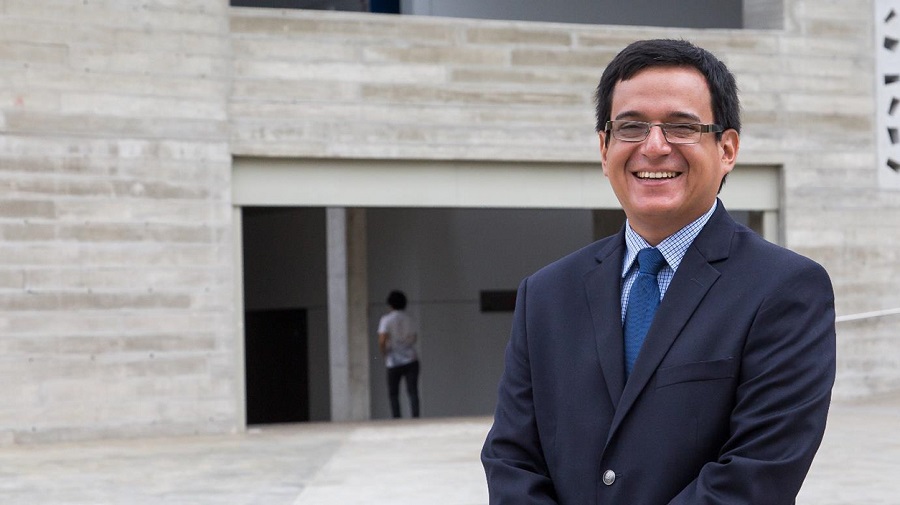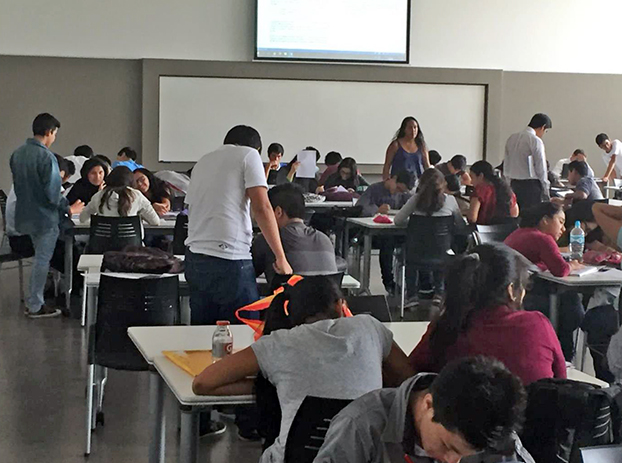
Dr. Marcos Agurto is Professor and Vice President for Research at the Universidad de Piura (UDEP). He specializes in development economics in combination with social inclusion. In 2016, he won the Japanese Award for Outstanding Research on Development (ORD) of 30,000 USD towards the implementation of his research on the effects of social interactions between wealthy and scholarship students, at a university in Peru.
Moving towards research on social inclusion within the scholarship program
Dr. Agurto studied Economics and obtained his PhD in this field at the Vancouver School of Economics (VSE). After his graduation, he started working as assistant professor at the University of Piura and continued his research on the adoption of technologies in rural communities. During his work at the university, he got interested in the issue of social inclusion of scholarship students at a private university. Dr. Agurto himself comes from a lower middle-class family and was able to study at a private university, so the importance of having access to quality education is evident for him. He feels, that through this research topic, he can help individuals both during their academic career and in their long-term future.
At his own university, he identified the Beca18 scholarship program as an interesting research opportunity. Beca18 is a scholarship program that has been set up by the Peruvian government in support of talented but economically disadvantaged students, to ensure their access to high quality education at elite private universities. His university had been a recipient of Beca18 fellows for over eight years.
One of the challenges in the program was the limited interaction between scholarship fellows and the more upper class or wealthy students. Several universities that received Beca18 fellows, initially segregated both groups in separate sections, with the intention of providing more support to the Beca18 fellows. However, through this separation students from poorer households would also not be able to obtain the necessary soft skills and contacts that students from relatively wealthy families already have. Therefore, Dr. Agurto proposed to change this and create mixed working groups, with both Beca18 and more wealthy students. In that way, he could observe the level of exposure between groups and analyse the potential effects of this on their interactions and educational benefits.
The impacts of winning the GDN award
For this innovative research idea, Dr. Agurto was awarded with a Japanese award for Outstanding Research on Development in 2016 and was conferred the prize during the 2016 Global Development Conference in Lima. With the grant funding, he was able to carry out the study and observe the academic outcomes of the working group interventions. His research showed that the performance of students of both groups increased when they worked in a more diverse group during their freshman year. He wrote a research paper about this study, which has been published in the scientific journal, Economics of Education Review in 2019.
“The grant put me on a track where I gained the abilities and capacities to successfully compete for research grants and to implement research in the field.” On a more personal level, winning the grant guided Dr. Agurto further towards the research topic of social inclusion. Before winning the grant, he had been exploring different research topics and questions. However, due to the ORD grant he was able to build his capacity to implement social inclusion research projects in the field.
The focus on social inclusion led to interesting developments for him. He was invited to participate in academic conferences around the world and form research networks both in and outside of Peru. One example of this is when he successfully presented his work on the topic at a conference in India, where social inclusion is a key issue, and his research was received positively. In addition, he was invited to join the editorial board of the Peruvian journal Economia and started mentoring research projects in Malawi and Guinea Bissau. After winning the ORD grant, he managed to secure other grants and funding to develop his research and expertise further.
“Winning the grant provided me with an important boost at an important moment in my career.”
Winning the ORD award helped Dr. Agurto to connect more closely with the Beca18 project, and inspired his follow up research on this concept. He sees the GDN award as a crucial step for the progress of his research career. He is now the Vice President for Research at the Universidad de Piura. In this capacity, he is responsible for helping other researchers at the university to find opportunities, to thrive in their own research. Winning the grant also gave him a clear sense of how to create these opportunities. A specific example of this, is that he recently set up of a seed fund at his university to promote innovative research ideas linked to the SDGs. The participating researchers will join in a seminar where they can work together and improve their ideas, before the winners receive a small seed fund to kickstart their research. This concept is based on specific elements Dr. Agurto had witnessed at the GDN Awards, such as the recognition of research efforts, taking risks and promoting local researchers.

Impact beyond the field of research
“Happy that I can do research, ask questions about problems that are relevant for our society and propose solutions. Our research contributes towards social change.”
The research outcomes have directly impacted practice at the UDEP university, as the university is now more conscious of the effects of the integration between the different groups of students. The research interventions led the university to create mixed groups during their courses.
Even though Dr. Agurto was able to present and discuss the research with policy makers at the Ministry of Education, influencing education policy proved to be challenging due to changes in government and corresponding priorities. However, he has witnessed a growing interest in his research topic and an increase in the number of citations, in the last few years. As a result, more people have started working on the Beca18 program impact in Peru.
Ambitions for future research projects
In his role as Vice President for Research, Dr. Agurto does not have a lot of time to focus on his own research. His main ambition is to help his fellows thrive in their own research, though he would like to continue conducting his own research as well. He has a lot of ideas for potential research questions on social inclusion and education. For example, how female role models can encourage girls to find their path within STEM fields. Dr. Agurto has also explored how community engagement strengthens the leadership capabilities of college students from disadvantaged backgrounds. He found that women in particular who participated in this program, felt more valued and respected in their communities, and improved their academic performance. He has also studied how technology adoption can be fostered by key members of the target communities, who can act as technological change ambassadors and promote social change. He remains passionate about research topics that directly benefit social inclusion and society as a whole.
Read other impact stories from the Global Development Awards Competition.
About the Global Development Awards Competition
The Global Development Awards Competition (GDAC) is an award scheme that identifies talent, supports the career advancement of researchers in developing countries, and funds innovative social development projects, implemented by NGOs, to benefit marginalized groups in the developing world. The award categories include the Japanese Award for Outstanding Research on Development (ORD), the Japanese Award for Most Innovative Development Projects (MIDP), and the Japan Social Development Fund Award (JSDF). Learn more.





